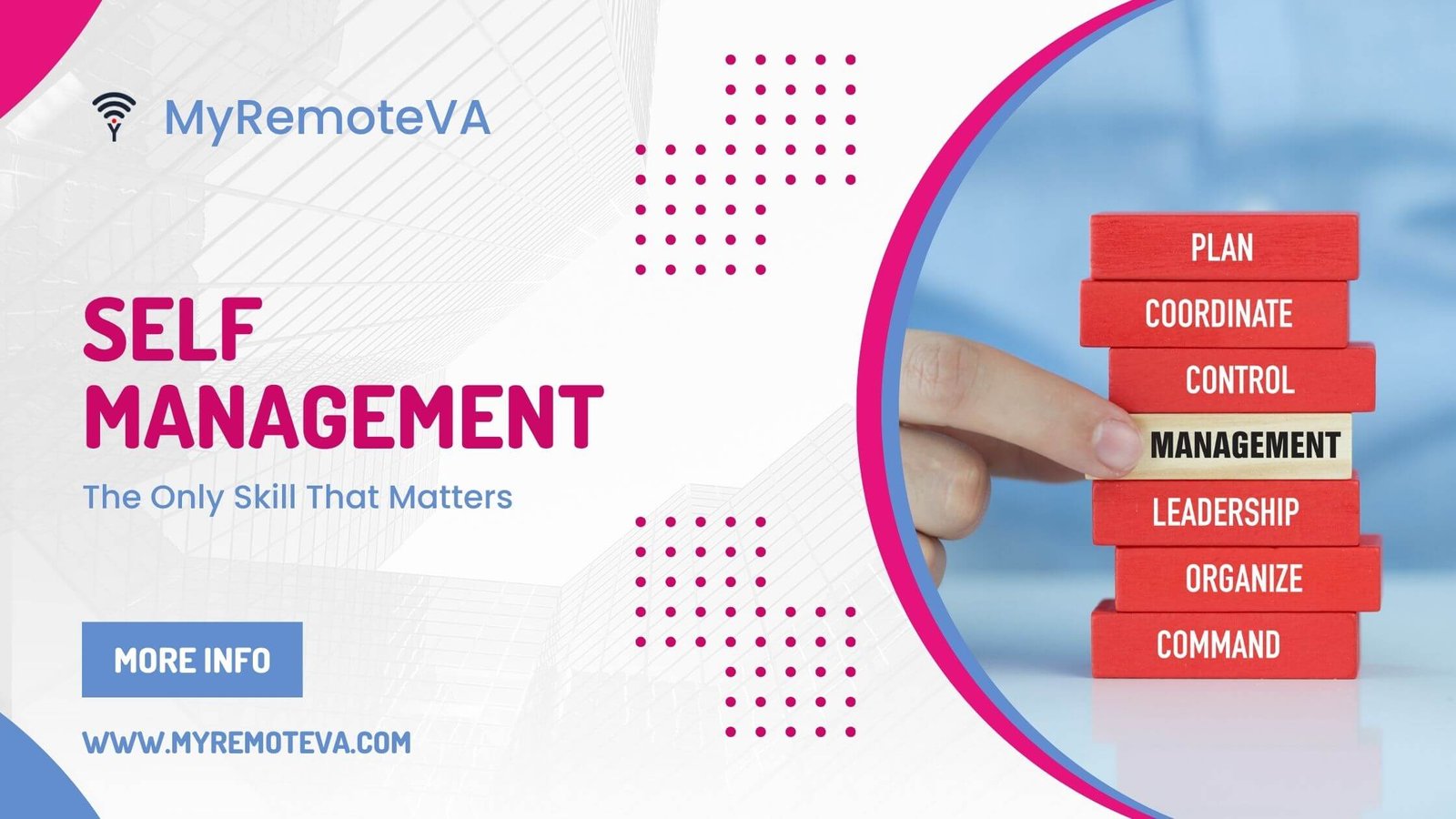You know that feeling, right? The one where you’re just running on fumes, reacting to every email ding and every “got a minute?” from a coworker? Your calendar is a battlefield, and at the end of the day, you’re left wondering where all the time went. That chaotic, reactive mode is the exact opposite of what true self management feels like. It’s not about being a rigid, hyper-scheduled robot. It’s about being the one in the driver’s seat of your own life.
In a world that’s constantly trying to pull you in a million different directions, mastering self-management is a secret superpower. It’s your ability to consciously steer your own thoughts, emotions, and actions to hit your goals. Whether it’s finally tackling that huge work project or getting a handle on your personal life, it’s the key difference between feeling overwhelmed and feeling completely in control. It’s your personal operating system, and when it’s running smoothly, everything else just falls into place.
What Exactly is Self Management, Anyway?
At its heart, self-management is a crucial part of emotional intelligence. It’s the capacity to control your own actions, thoughts, and feelings. But let’s be clear: this isn’t some military-style discipline. It’s about flexible control and intentionality. It’s about knowing yourself well enough to recognize your triggers—those things that make you procrastinate or get sidetracked—and then choosing a more productive path.
I can still remember my early days at my first real job. My desk was a disaster zone, covered in sticky notes and half-finished coffee mugs. My calendar was just a list of things I hoped I’d get to, and my stress levels were through the roof. I was a hard worker, sure, but I was also a professional procrastinator. I’d put off my most important tasks until the last possible minute, then pull an all-nighter in a total panic. Sound familiar? That, my friend, is a textbook case of poor self-management.
Once I finally started to get serious about my self-management skills, everything changed. I learned to break down daunting projects into manageable steps, to schedule my day with a purpose, and to take real, intentional breaks to recharge. It was a complete game-changer. I wasn’t just busy anymore; I was actually getting things done. And the best part? That constant, low-grade buzz of anxiety I used to carry around started to disappear.

The Building Blocks of Effective Self Management
Think of self-management not as a single skill, but as a set of interconnected abilities. When you get better at one, you’ll find it naturally improves the others. These are the core pillars that support a truly self-managed life.
Mastering Your Time for Better Self Management
Your time is your most valuable resource. Learning to use it wisely is the foundation of self-management. This goes beyond a simple to-do list. It’s about prioritizing what’s truly important, planning your day with intention, and fiercely protecting your time from distractions. One of my favorite tools for this is the Pomodoro Technique. Twenty-five minutes of focused work, followed by a five-minute break. It’s a simple little trick, but it’s amazing how much it helps you get into a flow state.
Beyond techniques, true time management is a mindset. Before you dive into your day, take a minute and ask yourself: “What are the three most critical things I need to get done?” Tackle those first. Everything else is secondary. This is a powerful way to make sure you’re always working on what matters most, rather than just keeping busy.
The Power of Self-Motivation and Accountability
Even the most perfect plan is useless without the drive to follow through. Self-motivation is that internal spark that keeps you going. It’s about setting goals that truly mean something to you and connecting with the reason why you’re doing the work. When you understand your purpose, work feels less like a chore and more like a personal mission.
Accountability is the other side of that coin. It’s about taking ownership of your actions and their results. It doesn’t mean you have to be perfect. It means when you make a mistake—and you will—you own it, you learn from it, and you get back on track. Finding an accountability partner, whether it’s a friend or a colleague, can make a monumental difference in staying on track.
Taming Your Emotions and Conquering Stress
This is where things get really interesting. Our emotions can be powerful, and if left unchecked, they can completely derail us. Self-management requires a high degree of emotional intelligence—the ability to understand what you’re feeling and why. When frustration starts to bubble up, can you pause before you send that email you’ll regret? Or do you react instinctively?
Mindfulness has been a life-saver for me. Just taking a few deep breaths, noticing what’s happening in your body, and observing your emotions without judgment can create a small but vital space between stimulus and reaction. It’s also where proactive stress management comes in. Don’t wait until you’re on the verge of burnout. Schedule breaks, get some fresh air, and make sure you’re taking care of your basics: sleep, nutrition, and exercise. It’s incredible how much a good night’s sleep can impact your ability to handle pressure.
On that note, have you ever considered delegating some of your routine tasks? You’d be shocked by the freedom it can give you. A virtual assistant can be an amazing resource for handling administrative work, managing your calendar, and freeing up your time for the high-impact stuff. To see how a virtual assistant could transform your productivity, take a look at this post on how a virtual assistant can help you with time management and productivity.
Applying Self Management in the Workplace
The office is the perfect proving ground for your self-management skills. The demands are constant, and the stakes are often high. Here’s how you can put these principles into practice and rise above the noise.
Setting SMART Goals for a Clearer Path
This isn’t about vague aspirations. When a new project lands on your desk, take a moment to clearly define what success looks like. What are the key deliverables? What are the deadlines? Break the project into smaller, more manageable chunks. This approach not only makes the work feel less overwhelming but also gives you a clear roadmap to follow. It’s an empowering way to stay on track and watch your progress, which is a powerful motivator in itself.
Sometimes, the biggest test is learning to say “no.” When new tasks pile up, it’s tempting to be a people-pleaser and say yes to everything. But that’s a quick route to burnout. Politely pushing back and advocating for your own workload is a critical self-management skill. It shows you respect your own time and are committed to doing high-quality work, not just a high quantity of it.
Building Productive Habits for True Self Management
Our lives are a collection of our habits, and self-management is all about building better ones. Don’t try to change everything at once. Pick one tiny habit and focus on it. Maybe it’s only checking your email at set times during the day. Or maybe it’s dedicating the first 15 minutes of your workday to planning out your priorities. Consistency is far more important than intensity. The ultimate goal is to make these productive behaviors second nature, so you don’t even have to think about them.

The Unexpected Perks of Getting Good at Self Management
When you hear the term, you probably just think “productivity,” but the benefits go so much deeper than that. It’s not just about getting more done; it’s about living a better, more fulfilling life. The rewards can be truly incredible.
Boosted Productivity and Efficiency
This one is pretty obvious. When you’re in control of your time and your focus, you’re naturally going to accomplish more. But it’s not just about speed—it’s about working smarter. You’ll find you’re not just checking off items; you’re completing tasks with greater precision and a higher quality of work. This improved efficiency can lead to amazing new opportunities and recognition, both professionally and in your personal life.
I saw this firsthand. When I started truly applying these strategies, my work became more polished, and I had more time to think creatively. My manager noticed, too. It’s truly amazing what happens when you’re not constantly scrambling to keep up.
Less Stress, More Well-being
The constant pressure of modern life can feel suffocating. Self-management provides a powerful antidote. When you have a plan and the skills to execute it, that knot of anxiety in your stomach starts to loosen. You’re no longer a passenger on a runaway train; you’re the engineer. This sense of control is so calming. It’s a huge factor in preventing burnout and maintaining a healthy work-life balance.
Honestly, I can’t emphasize this enough: your mental health is your greatest asset. By taking proactive steps to manage your emotions and stress, you’re not just improving your performance; you’re making a serious investment in your long-term happiness. Practicing mindfulness, a cornerstone of self-management, has a remarkable impact on mental clarity and overall health. For more on the science behind it, a good resource is the National Health Service’s guide to mindfulness.

Sharper Problem-Solving and Decision-Making
When you’re calm and collected, your brain just works better. It’s a simple truth. By managing your stress and emotional state, you free up mental space for higher-level thinking. This means you can approach tough problems with a clear head, weigh your options more effectively, and make much better decisions. You become a leader who doesn’t just react to problems, but one who solves them with grace and foresight. It’s an incredible skill that can really set you apart.
Ready to Take Charge? A Simple Guide to Self Management
So you’re ready to stop being a passenger and start driving. Where do you begin? Don’t worry, you don’t have to climb the entire mountain in one go. Think of it as a journey, one small step at a time. Here’s a simple, actionable guide to get you started.
Step 1: Start with Self-Awareness
You can’t manage what you don’t understand. Your first mission is to become a detective in your own life. Pay attention to how you spend your time. What are your personal triggers? When do you procrastinate? What makes you feel completely overwhelmed? Try keeping a simple journal for a week to track your habits, your moods, and your energy levels. Just observing without judgment can give you some amazing insights.
Step 2: Set SMART Goals that Actually Work
Vague goals get you nowhere. Make sure your goals are SMART: Specific, Measurable, Achievable, Relevant, and Time-bound. Instead of saying, “I want to be more productive,” try, “I will finish the marketing report by Friday afternoon by dedicating 2 hours to it each morning.” This clear definition makes it so much easier to stay on track and hold yourself accountable. For me, a game-changer was using a project management tool for my personal tasks. Seeing my progress and checking off completed items gives me a huge sense of accomplishment—that little hit of dopamine is a major motivator.
Step 3: Build a Consistent Routine
Routines are your secret weapon against decision fatigue. When you have a solid routine, you’re not wasting energy on a million small decisions throughout the day; you’re just following a plan. This frees up mental bandwidth for more important things. Your routine doesn’t have to be rigid. It can be as simple as having a morning ritual, or a set time each day for tackling emails.
Part of a great routine, especially for a busy professional, is knowing when to offload tasks. Have you ever considered what it would be like to have a dedicated assistant to handle all those small but time-consuming tasks? For a deeper dive into this, check out this great article on virtual assistants for administrative tasks. It’s all about creating a system that truly supports your productivity.
Step 4: Make Time for Self-Care and Reflection
Self-management isn’t just about work; it’s about your whole well-being. This includes your physical, mental, and emotional health. Make time for exercise, proper nutrition, and adequate sleep. And don’t forget to build in a few minutes each day for reflection. Think about what went well and what you could do differently. This is how you learn, adapt, and grow over time. This powerful practice will help you build lasting skills for the future.
Getting a handle on your self-management is a truly incredible journey of personal growth. It will change the way you work, the way you live, and how you feel every single day.
FAQ about Self Management
What are some examples of self management skills?
Self-management is a broad set of skills, but the most important ones include time management, setting goals, self-discipline, emotional regulation, stress management, and being adaptable. They all work together to help you stay on track and feel in control.
Why is self management so important in the workplace?
In the workplace, strong self-management is invaluable because it directly leads to increased productivity, better focus, and improved performance. Employees who can manage themselves effectively require less supervision, handle pressure with more grace, and are much more effective team members. This skill is a huge plus, especially in today’s remote and flexible work environments.
What’s the difference between self-management and self-control?
Think of self-control as one part of the larger system of self-management. Self-control is about your ability to resist an impulse or delay gratification in a specific moment. Self-management, on the other hand, is the bigger picture—it includes planning, setting goals, and creating habits that make those tough, moment-to-moment decisions easier. So, self-management is more proactive and strategic, while self-control is often reactive.
How can I get better at self-management?
The best way to start is with self-awareness. Try journaling to understand your habits. Then, set clear, SMART goals for yourself. Develop consistent routines that support those goals. Practice mindfulness to better regulate your emotions and stress. The key is to start with one small change and build from there. You’ll be surprised how quickly those little changes add up.










